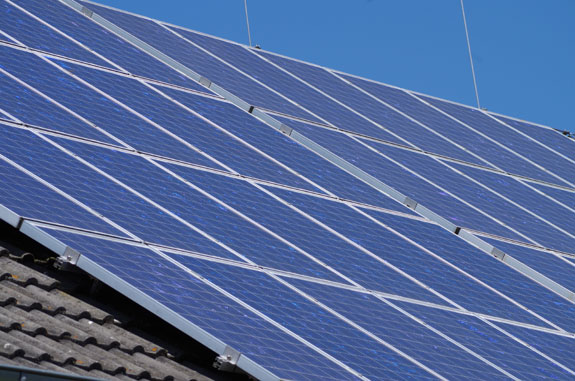
State law has inhibited the growth of the rooftop solar industry in Florida. (Photo: Stock.xchng.)
By Eric Barton
Florida Center for Investigative Reporting
Back when Dr. Paige Kreegel was a state representative in 2009, he had an idea that he thought simply made sense. Florida, the Sunshine State, should become a model for solar power.
Media PartnersFlorida Times-Union |
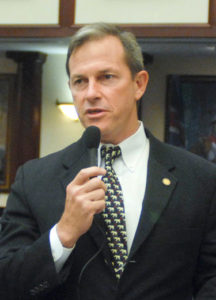
Former State Rep. Paige Kreegel found that his support of the rooftop solar industry made him an outcast in Tallahassee. (House photo by Meredith Geddings.)
As chair of the state House’s Committee on Energy, Kreegel was in a position to change Florida laws that have restricted the growth of energy-producing rooftop solar panels on homes in Florida. As a self-described free-market Republican, Kreegel saw the issue as getting government out of the way of a growing industry.
But Kreegel soon discovered that his fellow committee members wouldn’t even discuss solar energy, and the fact that he brought it up made him an outcast in Tallahassee. When he walked the halls of the Legislature, other lawmakers would turn around and shut their doors.
“You know how Tallahassee has an in-group and an out-group?” said Kreegel, a physician in Punta Gorda who left the House in 2012. “I didn’t know I was on the outside until I went against the public utilities, and then — holy hell.”
Kreegel isn’t alone. Other state lawmakers and lobbyists say that anyone who has attempted to expand the rooftop solar industry has been ostracized and seen their proposals go nowhere. The reason, some lawmakers say, is that Florida’s largest utility companies have invested heavily in state political campaigns to fend off competition from rooftop solar power.
An analysis of campaign records by the Florida Center for Investigative Reporting shows that the utility companies have sunk $12 million into the campaigns of state lawmakers since 2010.
That money comes from the bills paid by customers of the state’s four largest utilities — Duke Energy, Gulf Power, Florida Power & Light, and Tampa Electric, or TECO.
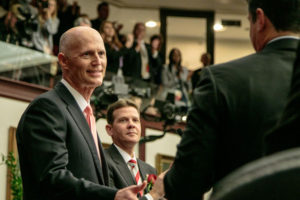
Gov. Rick Scott’s 2014 re-election campaign took in more than $1.1 million from the state’s utility companies. (Photo courtesy of Gov. Scott.)
Those donations include contributions to every member of the Senate and House leadership. The recipient of the most utility money since 2010 is Gov. Rick Scott’s 2014 re-election campaign, which took in more than $1.1 million through two political action committees.
“Why don’t we have a bigger solar industry in Florida?” asked Mike Antheil, a West Palm Beach lobbyist who represents solar companies. “The answer is simple. Every kilowatt of solar you produce on your roof is one less kilowatt that the utilities can sell you.”
The state’s largest utilities declined to comment on specific questions related to this article.
In an email, Duke Energy spokesperson Sterling Ivey said the company could not comment “since there is pending/proposed legislative bills that we are actively monitoring.”
Cherie Jacobs, a spokesperson for Tampa Electric, or TECO, said: “We participate in the political process, we support both parties, and we support candidates who focus on building the economy and on creating jobs.”
FPL spokesperson Alys Daly wrote in an email that the company supports “customers who want to install their own solar panels, and we take special care to serve the specialized needs of our solar customers.”
With little support in Tallahassee, a coalition of conservative and liberal groups hopes to make Florida friendlier to rooftop solar energy with a 2016 ballot initiative. Before that happens, though, Florida’s four largest power companies may see their influence grow. There’s proposed legislation circulating in Tallahassee now that would stop homeowners from selling extra energy created from solar back to utility companies, perhaps the biggest blow yet to Florida’s fledgling solar industry.
Big Energy’s Campaign Cash
Only a small portion of the $12 million spent since 2010 by electric companies on political campaigns went directly to candidates. Instead, most of the utility money went to political action committees and political parties.
Half of the money, $6.68 million, went to the Republican Party of Florida. The second-largest recipient of electric company money, the Florida Democratic Party, took in $1.8 million.
Donations of this type allow the utilities to avoid state campaign contribution limits, which cap donations to Florida legislative candidates at $1,000 per election cycle.
Conservative political action committees top the list of those receiving contributions, with the Florida Conservative Majority, Freedom First Committee, and House Republican Campaign Committee all receiving over six figures each from the utilities.
Among the politicians who have received power company money, Gov. Scott tops the list. The utilities gave $15,444 directly to Scott’s campaign fund. They also gave $600,000 to Scott’s Let Get to Work PAC. The utilities handed another $670,000 to the RGA Florida PAC, which in turn gave $500,000 to the Let’s Get to Work PAC. That puts the electric company contributions to Scott, both directly and indirectly, at $1.1 million.
In the Legislature, all 16 state senators and representatives who make up the legislative leadership have received utility money. In total, they have pulled in more than $200,000 from utilities and their interest groups.
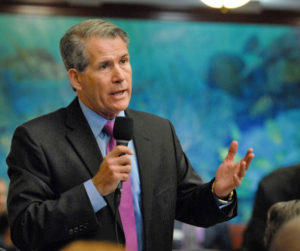
State Rep. Dwight Dudley, D-St. Petersburg, believes the utility companies’ campaign contributions have kept pro-solar legislations from gaining traction in the Florida Legislature. (House photo by Meredith Geddings.)
Those donations to the leadership allow the power companies to keep pro-solar bills from getting anywhere, said state Rep. Dwight Dudley, D-St. Petersburg, a supporter of the rooftop solar industry.
“We in Florida are stuck in the stone age. This is probably the most byzantine energy legislation in the country,” Dudley said. Dudley has filed legislation that would have increased renewable energy in the state, including solar, but none of his ideas have made it to the House floor.
Taking on the utilities has made him an outcast, Dudley said. He was talking with an acquaintance at an event last year in St. Petersburg when a utility lobbyist walked up and said, “Oh my gosh, do you know who this is? The devil’s holy man,” Dudley recalled. “It was loud and unpleasant, and it became very uncomfortable.”
As for Kreegel, the former state representative initially had support from the state’s utilities. That’s because Kreegel opposed mandates that required a percentage of the state’s energy come from renewable power, including solar.
But he lost that support when he worked to remove restrictions on rooftop solar, which Kreegel says is a big reason he’s now out of politics. In 2012, Kreegel ran in the Republican primary for the U.S. House seat in Fort Myers vacated by Republican Trey Radel, who resigned after being arrested for attempting to purchase cocaine from an undercover police officer in Washington, D.C. Supporting solar power back in 2009 caused him to be labeled a nonconformist, Kreegel said, and he didn’t get support of the Republican Party. He finished third.
“The whole point was that government shouldn’t be impeding in good business,” Kreegel said of his idea to support solar. “But I learned you don’t go against the utilities.”
Failed Reforms
The Florida law that has restricted the growth of the rooftop solar industry has been on the books for nearly a century. It was written to give utilities a regional monopoly on power production, avoiding a tangle of power lines strung up by competing companies.
The law didn’t affect the solar industry until the last several years, when the price of solar panels made it cost-efficient enough for rooftop solar to compete with utility companies. With ample sunshine, only two other states, California and Texas, have more rooftop solar power potential than Florida, according to the U.S. Department of Energy. Yet the state ranks 13th in installed solar capacity.
The average home solar array now costs $15,000 to $30,000 and can pay for itself in 10 to 20 years, said Ray Johnson, president and founder of the U.S. Solar Institute, an Oakland Park, Fla., school that teaches technicians how to install the panels. (Daly, the FPL spokesperson, claimed in an email that solar is not cost effective and instead pointed to the utility’s “highly efficient system and low electric rates.”)
The problem is that few homeowners want to pay up front for the system, Johnson said. In about half of the states, solar companies can install panels for free and then sell the power to the home or business owner at a rate lower than local utilities, paying for the system over time. These third-party sales are generally illegal under the Florida law that gives utility companies a local monopoly on supplying power.
Since Kreegel’s unsuccessful attempt to expand solar power in 2009, other lawmakers have tried as well, only to watch their bills languish in committee.
State Sen. Jeff Brandes, R-St. Petersburg, submitted a bill last year that would have given a tax break to businesses and homeowners who installed solar. The law would have meant the property tax value of the home or business could not increase as a result of the value of the solar panels. His bill never received a hearing in Senate committees.
This year, Brandes has filed a new bill that would allow businesses that produce extra energy from solar cells to sell that energy to neighbors, but it faces an uphill climb in the Legislature.
“Here’s how the power companies control the Legislature: They ask the chairman of committees to never meet on the issue,” Brandes said.
Solar’s Unlikely Coalition
With few allies in Tallahassee, the state’s rooftop solar power industry is now looking to bypass lawmakers. A proposed constitutional amendment, which may appear on the 2016 ballot, would allow third-party solar power sales in Florida.
The effort is being organized by an unlikely collection of interests, including the Christian Coalition, pro-retail groups, the Tea Party, and clean energy supporters. The idea brings together those who support fewer government regulations and those who support reducing carbon emissions, said Tory Perfetti, a Republican operative from Tampa working with a group called Floridians for Solar Choice.
“Finally, the sun is shining on the process of opening the energy market in Florida,” Perfetti said.
The ballot initiative is being funded in part by Floridians for Solar Choice, a political action committee. It’s not easy to trace the source of the money being given to the pro-solar initiative — unlike with the utility company money. Most of the contributions to Floridians for Solar Choice, totaling $264,457, came from the Southern Alliance for Clean Energy Action Fund, which does not report the source of its money.
George Cavros, a Fort Lauderdale lawyer who works for the Southern Alliance for Clean Energy, said the group will not reveal the source of the money to protect “the privacy wishes of individual donors.”
The Southern Alliance for Clean Energy has claimed in filings with the Federal Elections Commission that it “does not participate or intervene in any political campaign” and therefore does not need to report its funding sources. It’s a position that has earned the group criticism for its use of “dark money” spending to indirectly support political campaigns.
The rooftop solar industry typically gets money from venture capitalists, private equity firms and large solar installers. In the last quarter of 2014, investors sunk $9.8 billion into the growing solar industry, according to a report from Mercom Capital Group.
Even with the money the ballot initiative has raised, it faces some formidable opponents. Cavros said he knows the state’s utilities will likely sink money into a campaign to fight it. A conservative group backed with money from big oil companies has already campaigned against it. Americans for Prosperity, funded in part by the Koch brothers, sent an email to supporters claiming the ballot initiative is “about money, and using government and taxpayers to prop up the solar industry.”
Even with the potential ballot initiative, lawmakers and rooftop solar power supporters say it could get tougher for the solar industry before it gets better. This year, the Legislature may consider new regulations that could cripple rooftop solar power in Florida. The new proposal would end net metering, which allows businesses and homeowners who have installed solar panels to sell excess electricity back to utility companies. Even if the ballot initiative passes, the loss of net metering would limit the growth of rooftop solar by removing the incentive of selling excess energy.
The American Legislative Exchange Council, or ALEC, a conservative interest group, has drafted the legislation that would end net metering, increasing the cost of solar power and likely limiting the industry’s growth. Since 2009, former state Rep. Jimmy Patronis, a Republican from Panama City who is now on the regulatory board that oversees energy in Florida, has been listed as ALEC’s state chair.
Antheil, the lobbyist for the solar industry, said the proposed legislation will likely get passed after getting tacked on to another bill during this year’s legislative session.
“It’s extremely frustrating, because solar in Florida might be going backward before we go forward,” Antheil said.
Regulatory Concerns
Florida regulators that oversee power companies have been far from allies of rooftop solar power. The Public Service Commission has set the rate that utilities buy excess rooftop solar at two to three cents per kilowatt hour. In 13 states, utilities must pay the rate at which they sell power, which in Florida is about 12 cents per kilowatt hour for homeowners. In November, the commission voted to end the solar rebate program at the end of the year and slash energy efficiency goals.
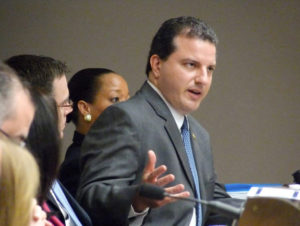
Former state Rep. Jimmy Patronis is now on the regulatory board that oversees energy in Florida. He has also been listed as ALEC’s state chair. (House photo by Mark Foley.)
“Solar power works now. It’s not 10 years from now. It’s not five years from now. It’s now,” said Scott McIntyre, CEO of Solar Energy Management in Tampa, which just completed a $2.6 million solar project expected to pay for itself in about six years. “We just need the state to get out of its way and allow solar power to grow.”
In November, the state’s Public Service Commission voted to end the state’s solar rebate program at the end of 2015 and to slash energy efficiency goals by 90 percent. That vote came at the requests of the utility companies, which argued the rebates and goals were not cost effective. In December 2014, the commission gave Florida Power & Light permission to collect $191 million from customers and use the money to enter the controversial fracking industry with a natural gas venture in Oklahoma.
The Public Service Commission has hampered the solar industry in Florida by setting the rate that utilities buy excess power produced by rooftop solar systems among the lowest in the country. The Public Service Commission has also been under fire for being too cozy with utilities. In September, Scott appointed Patronis, the former state representative and a Panama City restaurateur, to the Public Service Commission. While in the Legislature, Patronis accepted $5,200 from power companies and filed a bill to weaken carbon pollution limits on power plants. Since 2009, Patronis has been listed as the state chair of ALEC.
Commission spokeswoman Bev DeMello said nobody from her office, and none of the commissioners, would respond to questions because the commission “currently has open dockets concerning issues you want to discuss.”
For now, rooftop solar companies in Florida look for ways to operate in Florida despite the laws that restrict the industry. With third-party sales outlawed, companies instead offer financing for solar power, said Scott McIntyre, CEO of solar panel installer Solar Energy Management in Tampa.
Recently, McIntyre’s company installed one of the state’s largest rooftop solar panel arrays at Great Bay Distributors’ new building in St. Petersburg. Five-thousand solar panels will produce 1.5 megawatts of electricity. The system will cost $2.6 million but will pay for itself in just over six years, McIntyre said.
“Solar power works now. It’s not 10 years from now. It’s not five years from now. It’s now,” McIntyre said. “We just need the state to get out of its way and allow solar power to grow.”
Grant Smith of the Florida Center for Investigative Reporting contributed data analysis to this article.
Correction: An earlier version of this story incorrectly identified state Rep. Dwight Dudley of St. Petersburg as a Republican. He is a Democrat.
Clarification: The legislation that would stop homeowners from selling extra energy created from solar back to utility companies is being promoted in Tallahassee by the American Legislative Exchange Council. It has not yet been sponsored by a member of the Florida Legislature.
